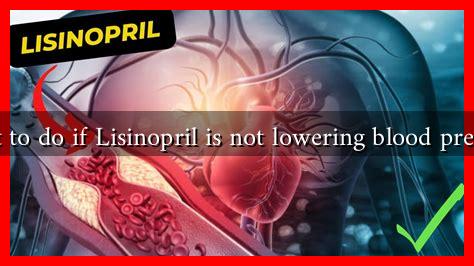-
Table of Contents
- What to Do If Lisinopril Is Not Lowering Blood Pressure
- Understanding Lisinopril and Its Mechanism
- Reasons Lisinopril May Not Be Effective
- Steps to Take If Lisinopril Is Not Working
- 1. Consult Your Healthcare Provider
- 2. Review Your Lifestyle Choices
- 3. Monitor Your Blood Pressure Regularly
- 4. Explore Alternative Medications
- Case Studies and Statistics
- Conclusion
What to Do If Lisinopril Is Not Lowering Blood Pressure
Lisinopril is a commonly prescribed medication for managing high blood pressure (hypertension). As an angiotensin-converting enzyme (ACE) inhibitor, it works by relaxing blood vessels, making it easier for the heart to pump blood. However, some patients may find that Lisinopril is not effectively lowering their blood pressure. If you find yourself in this situation, it’s essential to understand the potential reasons and explore alternative options.
Understanding Lisinopril and Its Mechanism
Lisinopril is often the first line of treatment for hypertension due to its effectiveness and relatively mild side effects. It helps to:
- Reduce the production of angiotensin II, a hormone that narrows blood vessels.
- Lower blood pressure by promoting vasodilation.
- Decrease the workload on the heart.
Despite its benefits, some patients may experience inadequate blood pressure control. Understanding why this occurs is crucial for effective management.
Reasons Lisinopril May Not Be Effective
There are several reasons why Lisinopril may not lower blood pressure as expected:
- Dosage Issues: The prescribed dose may be too low for your specific needs.
- Medication Interactions: Other medications or supplements may interfere with Lisinopril’s effectiveness.
- Dietary Factors: High sodium intake can counteract the effects of blood pressure medications.
- Underlying Conditions: Conditions such as kidney disease or hormonal disorders can affect blood pressure regulation.
- Non-Adherence: Not taking the medication as prescribed can lead to poor outcomes.
Steps to Take If Lisinopril Is Not Working
If you find that Lisinopril is not effectively managing your blood pressure, consider the following steps:
1. Consult Your Healthcare Provider
The first and most crucial step is to speak with your healthcare provider. They can assess your situation and determine whether:
- Your dosage needs adjustment.
- Another medication may be more suitable.
- Additional tests are necessary to rule out underlying conditions.
2. Review Your Lifestyle Choices
Sometimes, lifestyle factors can significantly impact blood pressure. Consider the following changes:
- Diet: Adopt a heart-healthy diet rich in fruits, vegetables, whole grains, and low in sodium.
- Exercise: Aim for at least 150 minutes of moderate aerobic activity each week.
- Weight Management: Losing even a small amount of weight can help lower blood pressure.
- Limit Alcohol and Caffeine: Both can raise blood pressure if consumed in excess.
3. Monitor Your Blood Pressure Regularly
Keeping track of your blood pressure at home can provide valuable insights into how well your treatment is working. Use a reliable blood pressure monitor and record your readings to share with your healthcare provider.
4. Explore Alternative Medications
If Lisinopril is not effective, your doctor may suggest alternative medications, such as:
- Angiotensin II receptor blockers (ARBs) like Losartan.
- Calcium channel blockers like Amlodipine.
- Diuretics, which help the body eliminate excess sodium and fluid.
Case Studies and Statistics
Research indicates that approximately 30% of patients do not achieve adequate blood pressure control with initial antihypertensive therapy. A study published in the Journal of Hypertension found that patients who switched from Lisinopril to an ARB experienced a significant reduction in blood pressure levels. This highlights the importance of personalized treatment plans.
Conclusion
If Lisinopril is not effectively lowering your blood pressure, it’s essential to take proactive steps. Consult your healthcare provider to discuss your concerns, review your lifestyle choices, and consider alternative medications. Regular monitoring and open communication with your healthcare team can lead to better management of your hypertension. Remember, effective blood pressure control is crucial for reducing the risk of serious health complications, including heart disease and stroke.

